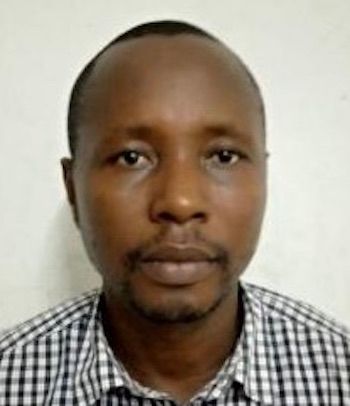Sallieu Tejan Jalloh

Summary: Sallieu Tejan Jalloh is an investigative journalist and publisher for Sierra Leone’s Times newspaper. He has faced many hurdles and continually fears for his safety after exposing ritual murders, corruption, and many other wrongful acts in Sierra Leone. Threats notwithstanding, he strongly believes that he should bring these issues to the attention of the public.
Profile: Sallieu Tejan Jalloh, journalist and publisher of Sierra Leone’s Times newspaper, sent a text message to Sierra Leone’s Chief Minister, David Francis, seeking clarification on an alleged $1.5 million bribe paid into the chief minister’s Ecobank account in Freetown. That didn’t turn out well for Jalloh: Francis immediately sent armed police officers to arrest him and lock him up. Jalloh was held in detention for two nights; the Chief Minister would not respond to state the reasons for his arrest. Finally, Jalloh was released and told to go home.
Speaking on radio shortly after his release, Jalloh gave an account of his text message sent to the chief minister and the manner in which he was arrested by armed police officers. “I felt I was being kidnapped,” he said. “So, I got a call from someone who says he has an advert for placement in my newspaper, but needed direction to drop the advert at my office.” Jalloh gave the caller directions. Soon thereafter, two unknown men came to him and said that they had left their flash drive in their car. Jalloh was asked to follow them to the car. That’s when he was arrested and whisked away.
Neither Jalloh’s journalism nor his dangerous encounters ended with that. After receiving word of alleged attempted ritualistic murders involving several virgin schoolgirls, Jalloh received anonymous threatening phone calls. Jalloh later told TV-News-24 that he fears for his safety because of his media outlet’s plans to reveal the identities of those behind the alleged attempted ritual murders. “Little did I know that these stories will result in threats of life,” he said. “I tried to live with these threats and continue my work.”
With the support of the Sierra Leone Association of Journalists, Jalloh wrote to the Criminal Investigations Department (CID) and other organizations about the threats, seeking to stop any such interference and arrests by police officers and other law enforcement agents on the work of journalists.
The government of Sierra Leone has recognised and categorised journalism as the Fourth Estate and an “essential service” during both the country’s experience with war, Ebola, and Corona. But the police, through the State CID, has continued to arrest journalists, including Jalloh, for exposing the corruption of highly placed politicians. These cases highlight the delicate balance between a free press, journalistic ethics, and the hurdles posed by Sierra Leone’s 1965 Public Order Act that was repealed in 2020.
Jalloh says that he continually faces challenges: “Threats are a daily thing, especially in our profession. I still remember after sending that text to the Chief Minister, I saw two unknown guys from the Criminal Investigations Department just standing outside my office. And many times, during the course of my work, I received calls and messages from unknown people advising me to let go.”
Some people view Jalloh as an opposition political tool, while others view his work as an essential part of democracy. Jalloh says that he is motivated to keep fighting because he wants to see a better Siera Leone:
“Journalism is such a powerful force applied to drive change, but it comes with risks and challenges, and I am ready to face the music and will not quit my work.”
